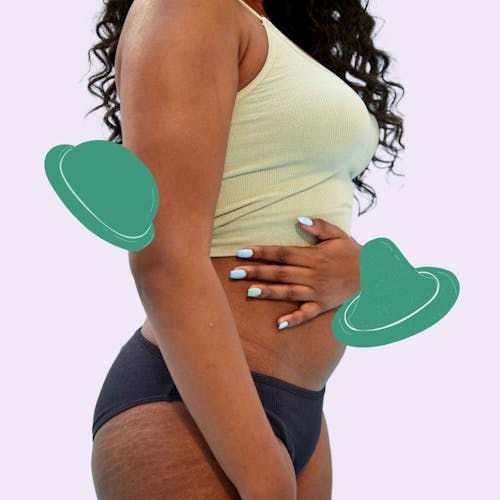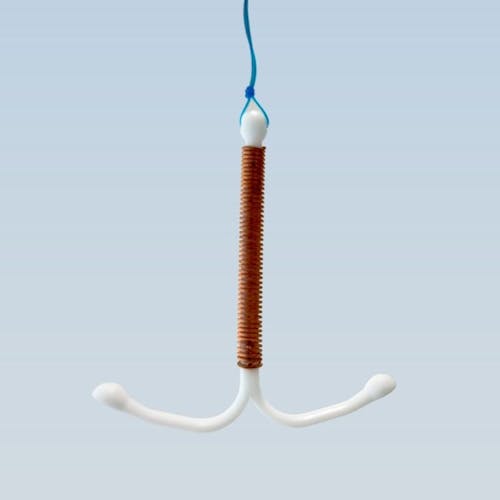This website uses cookies to enhance the user experience. By using Yoppie you are agreeing to our use of cookies.
Copper vs Hormonal IUDs: What To Know
Written by Yoppie
27 Sep 2021
What is an IUD?
What are the general benefits of having an IUD?
OK, so what’s the hormonal IUD?
And the copper IUD? That sounds scary!
Which IUD should I choose?
How do I find out more about both options?
The idea of putting any sort of ‘device’ inside your body can be daunting. It is a temple, after all! So when it comes to birth control, it’s normal to want to know the ins and outs of all the different IUD options there are. Here, we’re pitting the copper and the hormonal IUD against each other, and looking at the pros and cons of each. Let’s get into it...
What is an IUD?
IUD stands for ‘intrauterine device’, and it’s a small T-shaped instrument that can be inserted into your uterus by a medical professional to help prevent pregnancy. They are typically made of plastic, and release either hormones or copper to protect you against pregnancy for between 3 and 10 years, depending on the type of device. IUDs work by stopping any sperm in their tracks so they can’t reach and fertilise eggs.
What are the general benefits of having an IUD?
While all birth control methods have their up and down sides, the benefits of the IUD make it a very popular choice for people who wish to avoid pregnancy.
The main advantages are:
- It's longer lasting than other methods of birth control
- Once it’s in, it’s in! You and your partner don’t need to think about it again for years
- It’s safe to use when breastfeeding, making it a popular choice for new mums
- It’s easy to remove (with a doctor’s help) if you want to try to get pregnant
- It could minimise menstrual pain, heavy periods, or pain from endometriosis
- Being more than 99% effective at preventing pregnancy, it is one of the most effective methods of birth control available
The disadvantages?
- Unlike condoms, the IUD does not protect against sexually transmitted infections
- Insertion can be painful for some people
- Insertion and removal requires intervention from a doctor
- Just as some people find their periods get lighter, some also find that periods become heavier, irregular, or more painful
OK, so what’s the hormonal IUD?
Hormonal IUDs work by releasing progestin (a synthetic version of progesterone) which thickens cervical mucus in order to stop sperm from reaching and fertilising an egg. As a backup, it also thins the lining of the uterus, so even if any sperm make it to the egg, the thin lining makes implantation extremely difficult.
In some cases, hormonal IUDs may also stop ovulation, thus effectively preventing pregnancy. There are several brands of hormonal IUD available, lasting anywhere from 3 to 6 years.
Pros of hormonal IUDs
- Some people report that the hormones in their IUD make their periods more regular, or they stop altogether
- Hormonal IUDs have been linked to reducing the risk of certain cancers, such as cancer of the endometrium (the uterine lining)
- If you are unable to use contraceptives that contain estrogen (for example, if you suffer with migraines), hormonal IUDs can be a good alternative
- There is some evidence to suggest that hormonal IUDs could be more effective than copper IUDs
Cons of hormonal IUDs
- They may not be suitable for people with conditions like pelvic infections, or certain types of cancer, such as cervical or endometrial cancer
- People with uterine distortions or fibroids may not be able to use a hormonal IUD
- If you have dealt with unexplained vaginal bleeding, it is recommended that you don’t use a hormonal IUD
And the copper IUD? That sounds scary!
While some people shiver at the thought of having metal inside their body, copper IUDs are actually very safe. They work exactly the same as the hormonal kind, except instead of releasing hormones, they release copper.
Copper works as a spermicide to damage any sperm, preventing them from reaching the egg. It also generates an immune response to stop eggs developing, and destroy eggs that do develop.
Pros of copper IUDs:
- If you can’t use hormonal birth control, copper IUDs are a safe alternative
- They actually begin working immediately, so can be used as an emergency form of birth control
- Copper IUDs can work for up to 10 years, so they’re a great long-term option
Cons of copper IUDs:
- Some people report heavier periods, so if you already have heavy or painful periods, or endometriosis, this may not be the best option
- People with an allergy to copper or Wilson’s disease cannot use a copper IUD
Which IUD should I choose?
There is no right answer when it comes to choosing birth control - everyone has different needs and body types, and so both the hormonal and copper IUD will create a unique experience for each person.
What’s good to know is that in both hormonal and copper IUDs, their safety and effectiveness are pretty much the same. Studies have shown that they are both more effective at preventing pregnancy than almost all other forms of birth control, and are more than 99% effective when used properly.
As an overview, if you’re looking for an IUD that could lessen period pain then hormonal could be the answer. Alternatively, if you aren’t a fan of adding extra hormones to your body, or you want something super long-lasting, a copper IUD could be the one for you.
How do I find out more about both options?
Speaking to your GP is always the best way to gather information and find out what might be right for your body. If you have underlying health conditions or already suffer with period problems, your doctor can recommend the kind of IUD that is safest for you, and likely to be most effective for what you’re looking for from your birth control.
Are you still unsure about which IUD to choose? Pop into our Instagram DMs at @itsyoppie or reach out to our private FB group where no topic is off-limits. Don't forget that our personalised period box can get organic tampons, hormonal supplements and much more delivered easily and regularly through your letterbox, so that's one less thing to worry about each month.
Section jump
Back to top
Subscribe To Our Newsletter
YOPPIE





© 2026 Yoppie is a registered trademark of Phlo Technologies Ltd.
Yoppie's supplements are not a substitute for a varied diet and healthy lifestyle and are not intended to diagnose, treat, or cure any disease. If you are pregnant, breastfeeding, have a medical condition or are under medical supervision, please consult with your doctor before taking any of our products.






